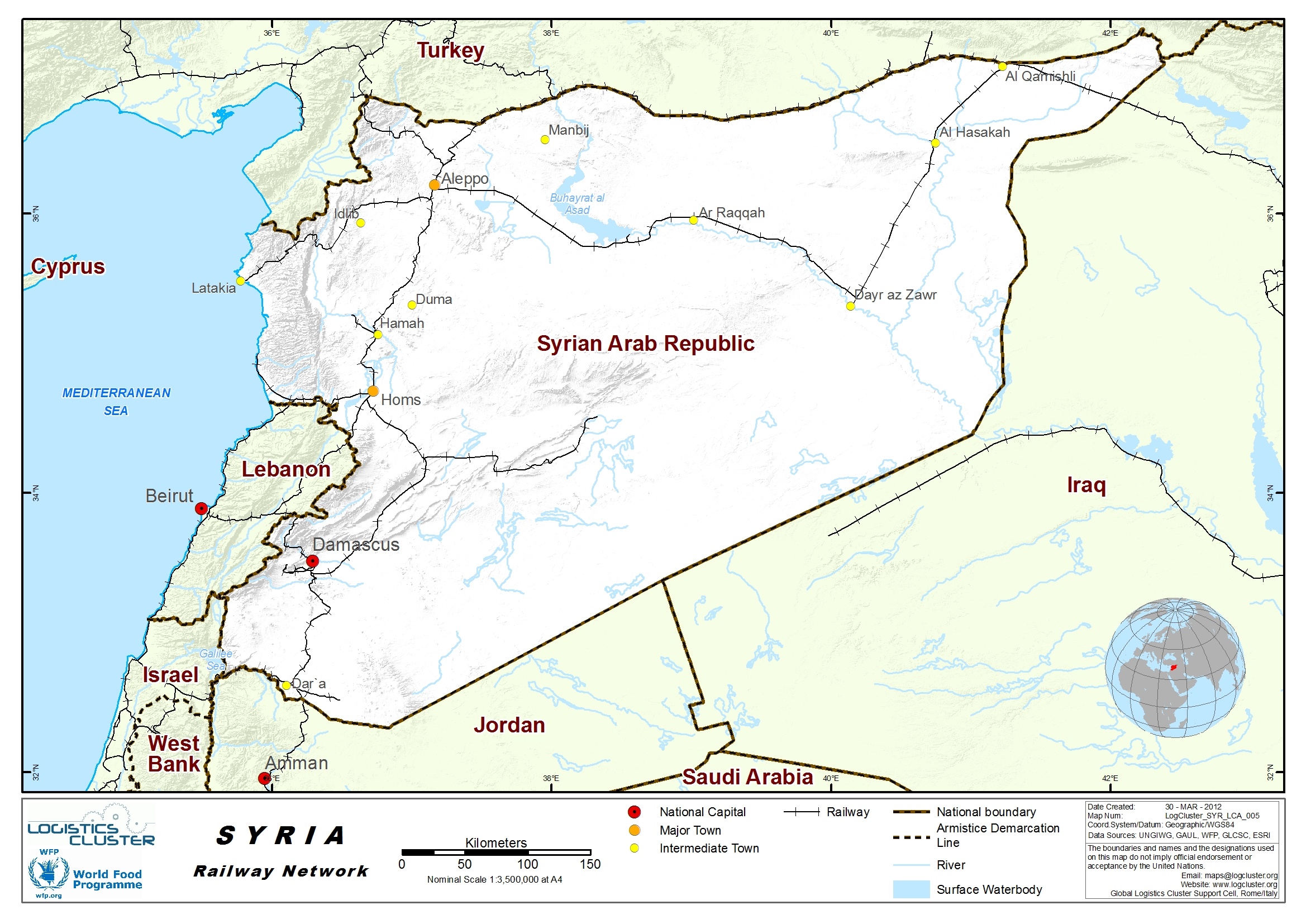Syrian Arab Republic Railway Assessment

Railway Service:
- Syria's railway service is reliable and inexpensive, there are two classes of rail travel but only first class carriages have air-conditioning
- The main railway route connects Damascus with Aleppo, Deir-ez-Zor, Hassake and Qamishle, with a secondary coastal route from Aleppo to the port of Latakia
- The Syrian railway network has a combination of standard gauge and narrow gauge lines
- The standard gauge (1.435m) network includes about 2,460 km of
rail track, has an axle weight of 20 tons with a speed of 120 km/h
for passenger trains and 100 km/h for cargo trains
The major line extends from the Lebanese border in the south to the Turkish border in the north, via Homs and Aleppo - In the northeast, another line connecting the Turkish and Iraqi borders.
- A line runs from the oilfields of Al Qamishly in the north to the port of Lattakia (750 km)
- the Homs – Palmyra line is opened to phosphate traffic bound to the port of Tartous
- the narrow gauge (1.050m) network is operated by Hijaz Railways has a total length of 251 km and an axle weight of 17 tons with a maximum speed of 60 km/h
- the Syrian rail network, headquartered in Aleppo, connects the major commercial and agricultural production areas
- All standard types of wagons are available including those for bulk grain transport
- The Tartous and Lattakia Ports have rail access, as do most major mills and grain silos
Other Information
-
The Syrian Railways have capacity of up to 10,000 Mt per day to Iraq
-
There are connections to the silos in Syria and to the Port of Tartous
-
Negotiations are currently underway to lower prices offered by the Syrian Railway
-
The Syrian Railway Line comes from Lattakia to Deir-ez-zor through Aleppo (or Tartous Aleppo via Homs) and then to Alkameshli until Al aroubiah (cross-border) to Iraq: Mosul, Baghdad, and onwards to the South: Al Naserieh and Al Basrah
-
The Railway line between Deir-ez-zor and Abu Kamal is still under construction
-
The Syrian Railways has freight traffic exchange with Turkish Railways (TCDD) of two trains per day per direction.
-
There are two international passenger trains per week in each direction running between Turkey (Istanbul) and Syria and also between Iran and Syria
-
In the North-East of the country, a second freight traffic exchange is taking place with Turkey with three regular freight trains per day in each direction. These three trains are transiting through Syria and destinated to Iraq
-
Only one border point located in the North-East of the country is operational between Iraq and Syria. The traffic exchange reaches three freight trains per day in each direction
-
In the future, another border point with Iraq will be opened when the line section Deir-ez-zor and Abu Kamal is completed
-
Between Lebanon and Syria there is no operational rail border crossing point
-
It is expected that the old rail link between Damascus and Beirut will be re-opened
-
Additionally, there is a plan to create a new international rail link between Tripoli (Lebanon) and Al Akkari (Syria)
-
The rail link with Jordan has one operational narrow gauge border crossing located at Dera’ where cross-border passenger and freight traffic.
-
Another border point will be become operational when the planned upgrade of the Hijaz Line to standard gauge is completed
4.1 Syrian Arab Republic Government Contact List
Railway Companies and Consortia
Note: The information provided in the attached document, which has been taken from the old DLCA, does not match the structure of the new LCA and is therefore provided separately.
Syria Road Network Additional Information
4.1 Syrian Arab Republic Government Contact List


